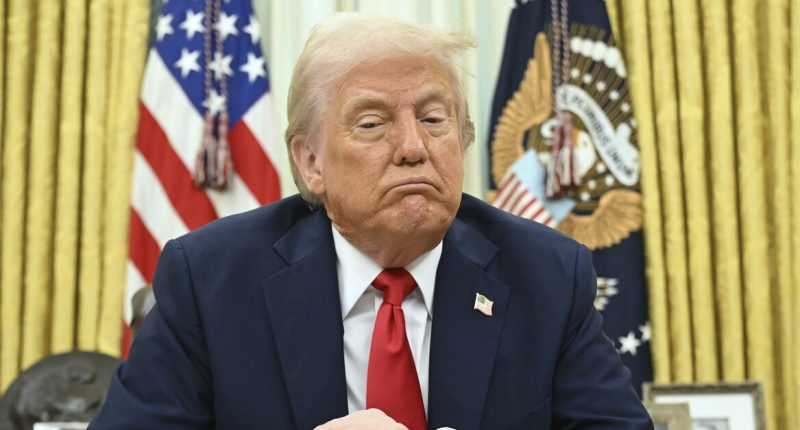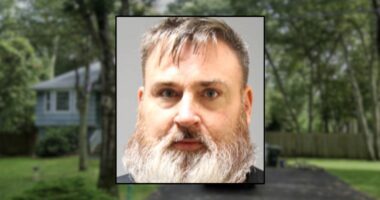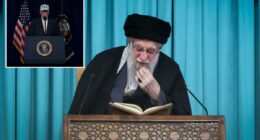Share this @internewscast.com
President Donald Trump addresses the press prior to signing an executive order in the Oval Office of the White House in Washington on Monday, March 31, 2025 (Pool via AP).
This week, the Justice Department maintained that the U.S. lacks authority concerning the fates of over 100 migrants sent to a terrorist prison in El Salvador with little to no due process under President Donald Trump’s contentious use of the Alien Enemies Act. However, a federal judge in Washington, D.C., remains skeptical of the administration’s claims.
On Thursday, U.S. District Judge James Boasberg began the discovery process in a lawsuit filed on behalf of several migrants currently held in the infamous CECOT — short for Centro de Confinamiento del Terrorismo — prison to assist the court in evaluating whether the U.S. exercises “constructive custody” over them, despite their present location.
Constructive custody, in the context of the federal habeas statute, extends to prisoners who are not in “actual, physical custody” because they are being held by someone else “under or by color of the authority of the United States.” Examples of constructive custody include a petitioner who is free on parole but still subject to parole restraints or where an individual is “imprisoned by a private party at the behest of the U.S. Government.”
The “most relevant” example of constructive custody, according to Boasberg, is a 2004 federal case out of the District of Columbia circuit in which the court held that federal habeas jurisdiction “was possible (indeed, likely) where a U.S. citizen was held abroad in a Saudi Arabian prison at the behest of U.S. authorities.”
The instant case, as well as several other high-profile lawsuits, hinges on the custody question and whether those allegedly unlawfully removed to El Salvador can be returned to the U.S. and receive the due process they were denied in mid-March.
Love true crime? Sign up for our newsletter, The Law&Crime Docket, to get the latest real-life crime stories delivered right to your inbox.
The petitioners have asserted that they were removed from the country under Trump’s “illegal Proclamation,” denied the opportunity to challenge their removal, and transported to a foreign prison currently “under contract with the U.S. government” where they “will be held indefinitely without trial.”
“Those claims, if ultimately borne out, would show that Respondents have violated federal law and Petitioners’ due-process rights,” Boasberg wrote in the seven-page order. “In such a case, the Government’s use of a foreign intermediary would not alone necessarily defeat habeas jurisdiction and shield its actions from judicial scrutiny. Indeed, our Circuit has already held that ‘teaming up with foreign agents cannot exculpate officials of the United States from liability … for [those] officials’ unlawful acts.””
The federal government for weeks has equivocated on its ability to “facilitate” the return of migrants from El Salvador, with the Justice Department steadfastly declaring that those detainees “are in the custody of a foreign nation pursuant to its laws.” However, as Boasberg noted during a Wednesday afternoon hearing, President Donald Trump last week told ABC News that he “could” just pick up the phone and have El Salvador return at least one man, Kilmar Abrego Garcia, who was “wrongfully deported,” before the president added, “we have lawyers that don’t want to do this.”
Boasberg on Wednesday repeatedly peppered Deputy Associate Attorney General Abhishek Kambli with questions about the apparent contradiction, possibly signaling which way he’s leaning at the early stages of the litigation.
“Is the president not telling the truth, or could he secure the release of Mr. Abrego Garcia?” Boasberg asked Kambli on Wednesday.
The DOJ attorney tried his best to sidestep the question by launching into a broader argument. But he was quickly brought back on track by the judge, who interjected to say he wanted his questions answered first.
“That goes toward the president’s belief about the influence that he has,” Kambli replied.
Boasberg returned to administration officials public statements several times during the hearing, with the DOJ repeatedly attempting to avoid the queries.
“What about Secretary Noem saying CECOT is ‘one of the tools in our tool kit that we will use if you commit crimes against the American people,’” the judge asked the government’s lawyer — quoting verbatim a triumphal statement by Department of Homeland Security Secretary Kristi Noem after a tour of the controversial lockup in March.
The government lawyer again tried to shrug off the question by saying that “sometimes” public statements by government officials “lack nuance” necessary to formal legal arguments.
The judge was not impressed.
“Is that another way of saying a number of these statements just aren’t true?” Boasberg pushed back.
Kambli insisted he was saying nothing of the sort.
Boasberg went on to emphasize that the existence of a contractual agreement between the U.S. and El Salvador to house the detainees — another subject on which federal officials have provided seemingly incompatible information — would also be a likely indicator of constructive custody.
“Is the United States paying the government of El Salvador to detain the migrants?” Boasberg pointedly asked.
To which the government’s lawyer replied: “There is no agreement or arrangement whereby the United States maintains any agency or control over these prisoners.”
Clearly feeling his question was, again, not really answered, the judge pushed back to note the existence of a $4.76 million grant to law enforcement in El Salvador that provides for housing the detainees.
That grant “could be used” for those purposes, the government’s lawyer said. He maintained, however, that the detainees are legally being held under the auspices of Salvadoran law.
“The idea is there is some immediacy,” Kambli argued at one point. “None of the cases the plaintiffs cited involved asking a foreign sovereign.”
In order to ascertain the “precise nature” of the petitioners’ confinement, Boasberg ordered jurisdictional discovery that should include whether the migrants “were detained at the behest of United States officials,” whether their ” ongoing detention is at the direction of the United States enlisting a foreign state as an agent or intermediary who is indifferent to the detention of the prisoners,” if they are being detained in El Salvador “to deny [them] an opportunity to assert their rights in a United States tribunal,” and whether they “would be released upon nothing more than a request by the United States.”

















